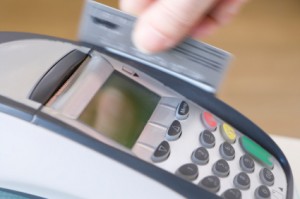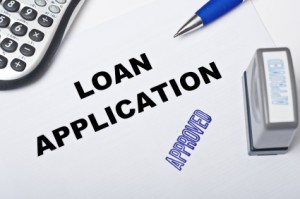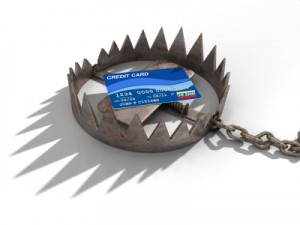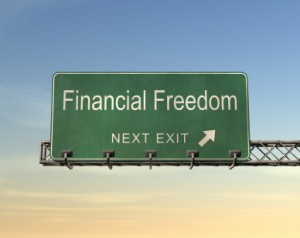Archive for the ‘Uncategorized’ Category
Monday, May 10th, 2010
 You do have to deposit money into a savings account to carry a secured credit card, so why not just use the cash? You do have to deposit money into a savings account to carry a secured credit card, so why not just use the cash?
Because there are a few times in life when a credit card is better than cash.
The first reason is convenience.
Cash won’t help you make a purchase over the Internet. If you want to buy something you’ll have to get out of the house and travel to a store. And you may have to visit several stores to find an item you can find easily through an Internet search.
Then cash won’t help you put gasoline in your car if all that chasing around keeps you out late. You’ll have to wait until morning when the station is open. And of course, that search costs money because gasoline is high priced.
Cash also won’t let you call ahead to reserve a rental car or an airline ticket, and it won’t let you call the opera house and buy tickets for an upcoming concert.
Next is safety. When you carry a secured credit card you have the same safety features as any other credit card. If your card is lost or stolen you need only make a phone call to prevent someone else from using your money. Depending upon the card and the terms, you might be out $50 – but that’s a lot better than losing a few hundred.
And as you know, if you lose a wallet full of cash, it’s gone. There’s no one to call to get it back.
Of course, carrying a standard credit card is the best choice. But if you’ve had credit problems, that might not be possible – at least not for a cost that’s within reason.
And that brings us to the third reason to carry a secured credit card.
Careful use of a secured credit card will help you re-build your credit scores.
Even though you’ve deposited the cash in a savings account to secure your card, your use is reported to the credit bureaus, and has the same effect as a normal credit card when it comes to re-building your credit scores.
When you use no more than 30% of your available credit at any one time, and when you make your payment on time each and every month, your credit scores will begin inching up. Combined with on time payment of your other obligations, this wise use will speed your progress toward the day when you can carry an unsecured credit card at a reasonable interest rate.
CreditScoreQuick.com your resource for credit cards, credit reports and Credit News.
Posted in Uncategorized | Comments Off
Thursday, May 6th, 2010
 The Federal government has announced yet another new program designed to “keep homeowners in their homes.” Unfortunately, this program, which is scheduled to go into effect this fall, has so many loopholes that it looks like Swiss Cheese. Those loopholes may render it just as infective as previous government programs. The Federal government has announced yet another new program designed to “keep homeowners in their homes.” Unfortunately, this program, which is scheduled to go into effect this fall, has so many loopholes that it looks like Swiss Cheese. Those loopholes may render it just as infective as previous government programs.
This is an FHA program designed to refinance non-FHA loans. It differs from HARP (the Home Affordable Refinance Program) in two significant ways:
- HARP allowed a loan-to-value ratio after refinance of up to 125% – the new program allows only 97.5%. However, when combined with a second mortgage, the homeowner may owe up to 115% of the home’s value.
Aside from qualifications such as being current on mortgage payments, occupancy of the home, a FICO score of at least 500, and income sufficient to make the new payment, this program requires cooperation that may or may not be forthcoming.
If there is a second mortgage, the second lien holder must agree to terms that have yet to be announced. If these terms are similar to those set forth in HAFA (the Home Affordable Foreclosure Alternatives program), then those second lien holders may be expected to walk away with very little return.
And finally, the first mortgage holders don’t have to cooperate. They will be required to reduce the principal balance to 97.5% of the home’s value – a reduction of at least 10% and in some cases considerably more. Homeowners in some of the hardest hit communities now owe twice what their homes are worth in the current market.
But… perhaps they will all cooperate, because the FHA fact sheet http://makinghomeaffordable.gov/docs/FHA_Refinance_Fact_Sheet_032510%20FINAL2.pdf notes the following:
“TARP funds will be made available up to a total of $14 billion to provide incentives to support writedowns of second liens and encourage participation by servicers, and to provide additional coverage for a share of potential losses on these loans.
The amount of relief given will probably be the deciding factor as once again, the taxpayers are forced to come to the aid of the banks.
Homeowners considering loan modification should remember that any mortgage debt written off will appear on their credit reports and will negatively affect credit scores for several years into the future.
Author: Mike Clover
CreditScoreQuick.com your resource for credit cards, credit reports and credit news.
Posted in Uncategorized | Comments Off
Tuesday, May 4th, 2010
 In a previous article we discussed how buying with a credit card rather than a check or money order can protect you if you don’t get merchandise you’ve ordered. But that’s not the only thing that can go wrong when you order on line or through the mail. In a previous article we discussed how buying with a credit card rather than a check or money order can protect you if you don’t get merchandise you’ve ordered. But that’s not the only thing that can go wrong when you order on line or through the mail.
What if you get the goods you ordered but the quality stinks?
This part of the Fair Credit Billing Act can be confusing, because it contains several “ifs.”
For instance, goods must have cost at least $50. Then the purchase had to have been made either in your home state or within 100 miles of your mailing address. So… you can’t go on vacation far from home and then come back and complain about things you bought while you were away.
If your credit card purchase was on line or over the phone… who knows? You need to call your card issuer to see if you’re covered. You made the purchase at your own address, but…
And here’s another “If.” If the credit card issuer is also the merchant, or if the seller mailed you an ad and you purchased from that ad, then the restrictions don’t apply.
Before you can make a claim you are generally required to try to work things out with the merchant. Do so carefully, and be sure that everything you do to attempt to resolve your issue is done in writing. If you talk on the phone, back that up with a written note that says something like “As we discussed in our conversation of April 30 at 1:15 p.m. Eastern time…” Be sure to get the names of everyone you talk with. Depending upon the policies your credit card issuer has in place, you may have to show proof that you tried to return the merchandise or get a refund.
That isn’t always easy, if you’re dealing with unethical companies. I know one young man whose credit card was billed for a health club membership after he had verbally canceled his membership when he moved out of town. It turns out that the fine print said he had to cancel by certified mail, so he tried that, but the health club refused the letter.
Whatever you do, keep paying at least the monthly minimum on your credit card while you’re disputing the charges. Your credit scores will suffer if your account shows non-payment.
Author: Mike Clover
CreditScoreQuick.com your resource for credit cards, credit reports and ground breaking credit news.
Posted in Uncategorized | Comments Off
Monday, May 3rd, 2010
 Since thousands who thought their jobs and income were secure are now facing long-term unemployment, it follows that thousands who never expected credit problems are now in trouble. Since thousands who thought their jobs and income were secure are now facing long-term unemployment, it follows that thousands who never expected credit problems are now in trouble.
With savings depleted, many are unable to pay the monthly minimums on their credit cards and those cards may eventually go into default – causing credit scores to tumble and leading to lawsuits for collection.
What does that have to do with your children?
It affects them if at some time you added them as authorized users on your credit card or cards.
Don’t panic – they aren’t responsible for your debts unless they were co-applicants.
But the “piggyback rule” that allowed your good credit to help them establish their own credit scores can now work against them. The activity on your credit card and your credit report will be reported under their names as well as yours – and when that activity is negative, your credit woes will lower their credit scores.
If you think you’re headed for default on your credit cards, the first thing to do is contact your credit card issuers and have your children’s names removed. In fact, if your spouse was not a co-applicant, have his or her name removed at the same time.
If you’ve already been late, they may not be willing to help you, so do this as soon as you see trouble on the horizon.
Next, your children should get copies of their own free online credit reports and see if your troubled accounts are listed. If so, they can contact the credit bureaus and challenge the debt. They’ll need to submit paperwork verifying that they are not the responsible parties on those accounts.
Aside from hurting their credit scores, the real trouble for your kids can come if your account is sold to a third party. All they’ll see is the names, not the status. So they could sue your children as well as you. Even if they saw the status, they might not care. Some of these 3rd party collection agencies are vicious. In fact, the tactics they use are such that you and your kids could receive a notice of judgment before even knowing you’d been sued.
If your children are sued you will have a good defense. But you’ll still have to pay for an attorney and your kids will still go through a hassle.
Author: Mike Clover
CreditScoreQuick.com your resource for credit cards, credit reports and Credit News…..
Posted in Uncategorized | Comments Off
Sunday, May 2nd, 2010
 Both the Federal Truth in Lending Act and the Fair Credit Billing Act offer some consumer protections. But you need to pay attention to the limitations and your own responsibilities. Both the Federal Truth in Lending Act and the Fair Credit Billing Act offer some consumer protections. But you need to pay attention to the limitations and your own responsibilities.
Here are some of the protections and restrictions:
Theft or loss: The Federal Truth in Lending Act protects you if your credit card is lost or stolen. Even if you fail to report it right away, your maximum liability is $50. But realize that a debit card and a credit card have different rules, even though they look alike.
Even though a thief will say “credit” at the register in order to avoid entering a PIN, the theft of a debit card must be reported within 2 business days or you’re liable. So keep track of that debit card. If you don’t notice it’s gone until after 2 days have passed, a thief can empty your bank account and you’ll have no means of getting the money back.
Billing “Errors” can be accidental or intentional.
You may have ordered from a company and your package was lost in transit, a computer may have stuttered and entered a charge twice, someone could have forgotten to give you a credit for goods returned – or, unfortunately, you may have ordered from a bogus company that never intended to ship the goods.
The Fair Credit Billing Act gives you the right to dispute these “errors,” and to have your dispute taken seriously. So whatever the reason for the error, you can probably get the charges reversed, but only if you act quickly. You must send a dispute letter within 60 days of the charge appearing on your monthly credit card statement. Then the card issuer has 90 days to follow up with an investigation.
This is one reason why using a credit card when ordering from an “unknown” company is far safer than sending a check or money order.
When you contact your credit card issuer, be sure to include all the information. Your name, address, and account number; a complete description of the charge in question; and the reason why you dispute the charge.
You aren’t obligated to pay for a disputed charge unless the card issuer determines that it is valid, but if you have other charges on the same statement, be sure to pay at least the minimum.
Otherwise, someone else’s mistake will show up as a reduction in your credit score!
Author:Marte Cliff
CreditScoreQuick.com your resource for credit cards, credit reports and credit news.
Posted in Uncategorized | Comments Off
Friday, April 30th, 2010
 Q: Q:
If I have filed a dispute with Equifax, do I need to file one with Transunion and Experian?
Nick..
A:
Hi Nick,
I am going to assume that what ever you are disputing on your credit report is also reporting to the other two credit bureaus. If this particular issues is, then yes you need to dispute to the other two bureaus as well. You can do this through our on-line credit report dispute links to Experian and TransUnion.
Mike Clover
CreditScorequick.com
Posted in Uncategorized | Comments Off
Tuesday, April 27th, 2010
 You know your credit score matters – it’s the yardstick by which you are evaluated and judged by lenders, landlords, employers, and even would-be spouses. You know your credit score matters – it’s the yardstick by which you are evaluated and judged by lenders, landlords, employers, and even would-be spouses.
The FICO credit score assigns each consumer a score from 300 to 850. And while they don’t reveal the mathematical formula used to assign that score, it’s common knowledge that your use of credit determines your score.
Consumers wanting to improve their credit scores have long wondered how much different activities would raise or lower their scores. And no one will say, perhaps because the answer is: “It depends.”
The truth is, the impact that an activity will have on your credit score depends upon which scorecard you are on.
FICO scoring uses 12 different scorecards that categorize consumers into groups of their financial peers. If you’ve had a bankruptcy you’re on one scorecard, while you’ll be on a different scorecard if you’ve had late payments but no bankruptcies. If you have a clean credit record but little credit use, you’ll be on a different scorecard from a consumer with clean credit and extensive use.
The number of points assigned to a given activity varies depending upon the scorecard you’re on. A credit application will “cost” a young person with little credit history a different number of points than it will cost a consumer who has been using credit for 30 years.
While this alone seems ridiculous, it gets worse. Your score is partially determined by comparison to others on your scorecard. So here’s what happens:
Say you’ve had a bankruptcy. You’ll be on a scorecard with others who have had a bankruptcy. Say also that you’ve worked hard to build and maintain a good credit record ever since. Your score might be at the top limit allowed for people on your score card. Then you reach the magic 10 year mark and the bankruptcy comes off your credit report.
It seems like that would be a good thing – that it would raise your score. But instead it could lower it, because you’ll automatically be moved to a score card with people who have not had bankruptcies – and you might not compare as favorably. You move from the top of one group to the bottom of another – and your credit score goes down.
The good news is that by maintaining good financial habits you can eventually rise to the top of the next scorecard.
In the meantime, do keep track of your credit scores on a regular basis. Get your free credit report with scores today and see where you stand. Then keep working toward a score of at least 760 – which will get you the best rates next time you need credit.
Author: Marte Cliff
CreditScoreQuick.com
Posted in Uncategorized | Comments Off
Monday, April 26th, 2010
 Are falling credit scores, the high rate of foreclosures, and personal bankruptcies the result of Americans feeling so insecure about themselves that they overspend in an effort to “keep up with the Joneses?” Are falling credit scores, the high rate of foreclosures, and personal bankruptcies the result of Americans feeling so insecure about themselves that they overspend in an effort to “keep up with the Joneses?”
Some financial gurus say yes. Along with envy, a belief in entitlement, and a need to spend in order to “feel better about oneself,” trying to keep up with the Joneses has led far too many Americans into crushing debt.
Think how many times you’ve heard statements such “I really can’t be seen in last year’s swimsuit!” or “I work hard, so I deserve this.”
Of course many don’t say those things out loud, they just feel that somehow they “should” be able to install a swimming pool, drive a new SUV, or buy a 52” flat screen plasma TV because their neighbors or their friends have them. If they didn’t do the same, those friends and neighbors might look down on them. Can’t have that.
So, armed with little pieces of plastic called credit cards, Americans marched off to the vendors and came home with the goodies – at a price that became impossible to pay when credit card issuers suddenly raised their interest rates and reduced credit lines.
So now what? With their credit scores in the basement and their credit lines gone, those consumers don’t have the means to continue buying all the “stuff” they didn’t need in the first place.
The possible up side of this crisis…
Change is often hard. But perhaps this change can turn out to be a good thing in the long run. Perhaps children growing up in this different atmosphere will learn to be happy without a steady flow of new toys and distractions. Perhaps adults will learn to enjoy what they have instead of trying to find fulfillment through spending.
This credit crisis may even be good for the earth. When people don’t have credit card lines to spend on trinkets that are quickly tossed aside, perhaps our landfills will cease to be overburdened with cast-offs.
My prediction: Those who can take this in stride and quit judging their own worth by their ability to engage in conspicuous consumption will be the winners in the next few years.
They’ll cut back on unnecessary spending and find ways to save even on necessary spending. They’ll get those credit card bills paid and rebuild their credit scores – and will have learned enough not to use their credit to excess in the future. And, hopefully, they’ll teach their children by example, so the next generation won’t get into the same mess.
Who knows, maybe people will begin taking pride in thrift.
Author: Mike Clover
CreditScoreQuick.com
Posted in Uncategorized | Comments Off
Saturday, April 24th, 2010
 On March 26 the government announced yet another program designed to help homeowners keep their homes. The new program, named the Temporary Assistance for Unemployed Borrowers program, will go into effect until later this year and many of the details are yet to be worked out. On March 26 the government announced yet another program designed to help homeowners keep their homes. The new program, named the Temporary Assistance for Unemployed Borrowers program, will go into effect until later this year and many of the details are yet to be worked out.
Will it be more helpful than the Making Home Affordable Modification Program? It’s too early to tell, but one hopeful word in the early reports is “requires.” However, it may only be available to those whose loan servicers are already HAMP participants.
This new program isn’t for everyone. In order to qualify, the homeowner must first request assistance while the loan is still current, or within the first 90 days of delinquency. Then he or she must prove receipt of unemployment benefits. That eliminates the self-employed and those whose unemployment benefits have run out.
The program will require lenders to offer three to six months’ of lower mortgage payments – not over 31% of current income – in the form of forbearance. Forbearance means that the unpaid amount is not forgiven, but deferred. So the program will not reduce the debt load.
Using the program will appear as a negative on the borrower’s credit report, but of course, delinquency is also a negative. Either way, the borrower’s credit scores will take a hit.
Why 3 to 6 months? Perhaps as a result of reports from the U.S. Bureau of Labor Statistics, which says the median length of unemployment is approximately four and a half months. This figure may come as a shock to those who have been seeking employment for a year or more.
They also report that the unemployment rate stands at 9.7%, but as we all know, the true figure may be as high as 22%. Statistics only count those receiving unemployment and actively seeking work.
What if there’s still no work after 6 months, or if new employment pays far less? In that case, participants will be considered for a loan modification through the HAMP program.
Due to another change in regulations, HAMP program loan servicers will be required to consider an approach that includes a write-down of some principal for loans that are more than 115% of the current value of the property.
But as with all these programs, the test for eligibility will be what benefits the lender most – not what benefits the homeowner. If loan modification is more beneficial to the lender than foreclosure, the homeowner will stand a good chance. If not, modification will be refused.
Author: Marte Cliff
CreditScoreQuick.com your resource for credit cards, credit reports, loans and credit news.
Posted in Uncategorized | Comments Off
Friday, April 23rd, 2010
 Consumers with low credit scores and limited down payment funds have long relied on FHA loans as the path to home ownership. But under FHA guidelines, they are limited in their choice of homes. Consumers with low credit scores and limited down payment funds have long relied on FHA loans as the path to home ownership. But under FHA guidelines, they are limited in their choice of homes.
For one thing, the home must meet certain standards. FHA contends that home buyers with lower credit scores and little cash for a down payment don’t have the financial means to make home repairs soon after purchase. But for the last 7 years there’s been an additional restriction.
In 2003 the Federal Housing Administration imposed an “anti-flipping” rule designed to reduce mortgage fraud. Under this rule, a FHA buyer could not purchase a home that had been owned by the seller for less than 90 days. In many cases, home buyers didn’t become aware of the rule until they attempted to purchase such houses and learned that they couldn’t use a FHA loan.
Now, in an effort to make more affordable homes available to these consumers, FHA has instituted a 12-month waiver to the rule.
Investors who buy foreclosure homes at auction generally need to spend some money on repairs before those homes can be offered for sale – especially if they’ll be offered to FHA buyers.
Thus, one of the provisions of the waiver could be a tripping point in the effectiveness of the waiver. FHA says that if a buyer agrees to pay more than 20% above the price the investor paid, the loan will come under more scrutiny. Some banks are just saying “no” to lending on such purchases.
So depending upon the price of the home plus the extent and cost of repairs, many homes could still be excluded. Waiting the 90 days isn’t a viable option, because the period begins when the sale to the investor is recorded and ends when the purchase contract with the new buyer is signed. Few investors will be willing to “hold” a home for a buyer who hasn’t signed a purchase contract.
Earlier Federal programs promised to help distressed homeowners through mortgage loan modification, refinance, and short sales – but fell short of success because banks were not willing to cooperate. This program, like the others, will only be as beneficial if the banks cooperate.
The best course of action for any future homeowner is to become qualified for a conventional loan by raising his or her credit scores, and to begin gathering funds for a down payment. The first step is to order a free online credit report with scores and see where you stand. Then follow the suggestions given on the free credit report and begin the climb to restriction-free home buying.
Author: Mike Clover
CreditScoreQuick.com
Posted in Uncategorized | Comments Off
Disclaimer: This information has been compiled and provided by CreditScoreQuick.com as an informational service to the public. While our goal is to provide information that will help consumers to manage their credit and debt, this information should not be considered legal advice. Such advice must be specific to the various circumstances of each person's situation, and the general information provided on these pages should not be used as a substitute for the advice of competent legal counsel.

|
 You do have to deposit money into a savings account to carry a secured credit card, so why not just use the cash?
You do have to deposit money into a savings account to carry a secured credit card, so why not just use the cash?


 The Federal government has announced yet another new program designed to “keep homeowners in their homes.” Unfortunately, this program, which is scheduled to go into effect this fall, has so many loopholes that it looks like Swiss Cheese. Those loopholes may render it just as infective as previous government programs.
The Federal government has announced yet another new program designed to “keep homeowners in their homes.” Unfortunately, this program, which is scheduled to go into effect this fall, has so many loopholes that it looks like Swiss Cheese. Those loopholes may render it just as infective as previous government programs. In a previous article we discussed how buying with a
In a previous article we discussed how buying with a  Since thousands who thought their jobs and income were secure are now facing long-term unemployment, it follows that thousands who never expected credit problems are now in trouble.
Since thousands who thought their jobs and income were secure are now facing long-term unemployment, it follows that thousands who never expected credit problems are now in trouble. Both the Federal Truth in Lending Act and the Fair Credit Billing Act offer some consumer protections. But you need to pay attention to the limitations and your own responsibilities.
Both the Federal Truth in Lending Act and the Fair Credit Billing Act offer some consumer protections. But you need to pay attention to the limitations and your own responsibilities. Q:
Q: You know your
You know your  Are falling credit scores, the high rate of foreclosures, and personal bankruptcies the result of Americans feeling so insecure about themselves that they overspend in an effort to “keep up with the Joneses?”
Are falling credit scores, the high rate of foreclosures, and personal bankruptcies the result of Americans feeling so insecure about themselves that they overspend in an effort to “keep up with the Joneses?” On March 26 the government announced yet another program designed to help homeowners keep their homes. The new program, named the Temporary Assistance for Unemployed Borrowers program, will go into effect until later this year and many of the details are yet to be worked out.
On March 26 the government announced yet another program designed to help homeowners keep their homes. The new program, named the Temporary Assistance for Unemployed Borrowers program, will go into effect until later this year and many of the details are yet to be worked out. Consumers with low credit scores and limited down payment funds have long relied on FHA loans as the path to home ownership. But under FHA guidelines, they are limited in their choice of homes.
Consumers with low credit scores and limited down payment funds have long relied on FHA loans as the path to home ownership. But under FHA guidelines, they are limited in their choice of homes.